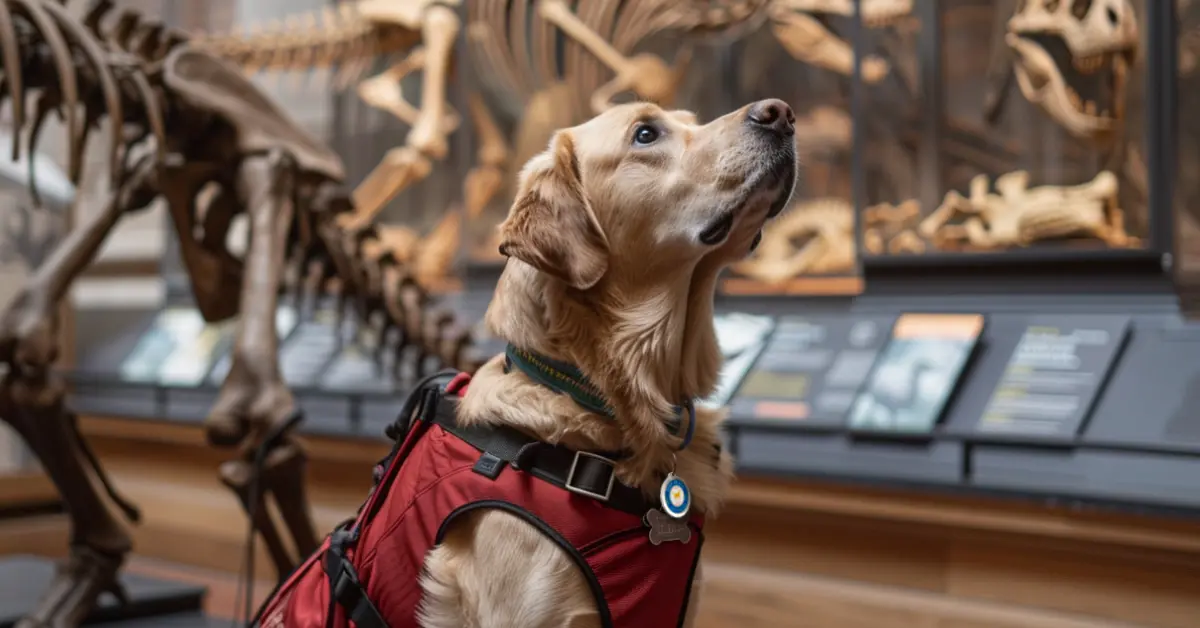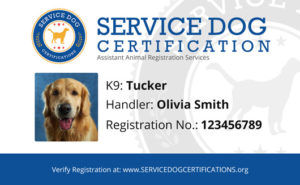Florida Service Dog Requirements

The Sunshine State allows service dogs to travel, reside with, and perform daily living activities with their owners. The State of Florida aligns with the federal American Disabilities Act (ADA), which provides service dog owners the rights and privacy with their service dogs. These rights cannot be denied, regardless of the local jurisdiction laws or private business ownership rules. Anyone who uses a service dog for their disability in Florida is protected by these laws and are entitled to the use of their animal.
What is a Service Dog?
The ADA definition of a service dog is similar to the Florida Statute 413.08 definition. Florida Statute 413.08 defines a service animal as one that is “trained to do work or perform tasks for an individual with a disability… A service animal is not a pet.” These tasks are vital for the quality of life of the person with the disability. For instance, a service dog may help obtain a life-saving medication, guide the visually impaired, or help with mobility issues.
How are Service Dogs Trained?
Service dogs must be trained to perform a task that the person with a disability would otherwise be unable to perform themselves. Their training must be specific to the needs of the person with the disability. Service dogs can be trained through a professional canine trainer or by the dog owner themselves.
If a trainer is training the service dog, Florida law allows them the full rights provided to a service dog owner during training sessions. They are allowed into public facilities and transport, just like service dog owners are. This will enable trainers the full ability to train a service dog well.
Identification and Registration Requirements for the State of Florida
According to Florida Statute 413.08, documentation that a service animal is trained is not required. Although not mandatory, registration is recommended as it allows easier access to all public accommodations. Having identification and registration available, though not necessary, mitigates any unexpected problems or harassment.
To protect the service dog owner’s privacy, the public can not inquire about the nature of the service animal’s owner’s disability. They may only ask two questions:
- Is this a service animal?
- What task has the animal been trained to perform?
Neither business nor private entities may ask personal questions such as:
- Asking the owner to have the animals perform their assigned task as a demonstration.
- Asking the service dog owner declare their illness or disability.
- Demanding documentation regarding registration or training.
Leash Requirements for Service Dogs
Florida laws require that a service animal must be under the control of its owner at all times. The service animal must be properly outfitted with supplies such as a leash, harness, or tether. If a leash, harness, or tether interferes with the tasks the dog must perform, then the dog must be under the owner’s control at all times through the owner’s voice or signal commands.
Service Dog Behavior Requirements
Although a service dog is essential to their owner’s well-being, both ADA and Florida laws are explicit about their expectations for public safety. These include the following points:
- Service dogs must be under the control of the owner at all times.
- Service dogs can be removed or excluded from an area if the dog is out of control, is not appropriately housebroken, or is a safety issue for the public.
- Fear of animals or allergies is not a justifiable reason for the exclusion of a service animal.
- If a service animal must be removed for being a threat, the service dog owner must be provided the option of remaining without the service animal.
- Damage caused by the service animal is the responsibility of the service animal’s owner.
Any person who interferes with these rights may be subject to a misdemeanor of a second-degree in the state of Florida.

Misrepresentation of a Service Dog
The state of Florida considers the misrepresentation of a service dog a second-degree misdemeanor. If a person knowingly presents themselves, in writing, verbally, or through their actions, as having a service dog and do not qualify as such, they may be subject to prosecution.
Public Accommodation for Owners of Service Animals
“Public accommodation” is a broad term and, in short, means that people with service animals are allowed anywhere the general public is also invited. For instance, hotels, public transportation, and resorts are examples of areas where service animals are allowed.
Safety of Service Animals in Florida
The service dog laws for the state of Florida are very similar to the federal regulations. Florida also goes the extra mile to protect its service animals, with laws against any interference or injury. These laws prohibit the obstruction, harm, or intimidation of a service animal by another person or an animal owned by that person. These actions are punishable as a misdemeanor in the first-degree or a felony of the third-degree, depending on the severity of the incident.
Know Your Service Dog Rights and Requirements in Florida
Being knowledgeable about the rights and requirements of service animals in your state helps keep you and the service animals safe. Respecting the laws, providing the service animals the safe space to do their job, and establishing the correct qualifications can keep the integrity of service dogs intact.
About the Author: The writing team at Service Dog Certifications is made up of folks who really know their stuff when it comes to disability laws and assistance animals. Many of our writers and editors have service dogs themselves and share insights from their own experiences. All of us have a passion for disability rights and animals.
30 comments
Leave a Reply Cancel reply
Latest Posts

Can you bring a service dog to a museum?
Yes, you can bring your service dog to the museum! All the major U.S. museums welcome guests with service animals in accordance with the Americans with Disabilities Act (ADA). There are some areas, however, that might be off-limits. Here’s what you should know if you plan to spend a day at the museum with your […]

Read More

How to Bring a Service Dog to Six Flags Magic Mountain
Service dogs are welcome at Six Flags Magic Mountain so long as they are, according to Six Flags, “trained to do work or perform tasks for people with disabilities.” Of course, your dog must be housebroken and remain on a leash or harness and under your control while at the park — and the park […]

Read More

When Stores Can Refuse Your Service Dog
According to the Americans with Disabilities Act (ADA), service dogs should be allowed into any store most of the time. A store owner can legally exclude a service dog if they are actively growling, snapping at, or frightening customers, or if the dog is obviously out of the control of its owner. Ordinary behaviors — […]

Read More




Me and my mom went into mount dora pizza with my mom’s service dog a few months back in 9/20. One of the employees told my mom that after that day she couldn’t bring her service dog back in and even told my mom when she offered to provide her documentation and id that,that didn’t matter she couldn’t bring her service dog back in because of other customers were complaining. My mom’s service dog is for alerting for medical issues to save my mom’s life. I left a post on their Facebook page about the incident and me,my mom,and several friends and family members have tried contacting them to find out what the issue was with no success. I would like for them to put something up stating they don’t allow any animals including service animals in the business or them be informed how the incident violated my mom’s rights. What do I do?
Heather: If the persist in denying you access when you return again, I would suggest seeing a lawyer since they are more than likely in violation of both State and Federal laws. I’m not a lawyer, but I would tell you to go see one.
IMO I would just do what you’re doing by posting the incident all over so people pressure them to do the right thing. If you do keep going there for pizza I would recommend ordering BEFORE you go in as take out so they don’t do something to your food! Then bring in your mom and her dog. By going back though you are supporting their business. Did you tell the girl what the ADA rules are for disabilities? Maybe she didn’t know? I would maybe send them a informative letter letting them know what happened and give the owners a chance to make it right because they may not have told everybody what the rules are. Good Luck
I was supposed to get my service dog from a Paws for Veterans as I have multiple illnesses and have bad balance and vertigo so I fall a lot and have very bad low blood sugar a lot. However, the organization was a scam and since my problems are not Service Connected so I had to pay $4,000 for its training. They are being investigated by the FBI for Fraud against Veterans & Sr. Citizens and animal abuse. I never got my $4,000 back or a service dog. (I only had the money to pay for its training as I had exactly $4,000 left from a settlement for being hit by a car while crossing the street with the walk light. Actually, I have been hit 3 times while crossing a street with the walk light) I am in a manual wheelchair in my apt. or if I go outside I have to use a scooter or Battery operated Chair.
I have been looking for someone to help me with the Obediance Training then the Service Dog Training but have been unable to find anyone in my area. (I live in Merritt Island, Fla) Can you help me as I really need the help of a Service Dog as I live with my son but am alone all day while he works. I can be reached on E-mail at ” or phone # . Any help will be greatly appreciated. (At present I have a 4 month Lab/German Shepherd puppy and really need help with her, but think she will make a good Service Dog for me) Besides the falling and low blood sugar I also have strokes, heart problems, Angina. Arthuritus (sp) and more
you have a great puppy that would make an excellent service dog. I would recommend obediance training first. Pet smart or most pets store offer them. Some even offer emotional animal support training, but be forewarn that emotional support animals do not have the same rights as a service dogs. You may be having issue about the service dog training.. that is where i ran into problems. ” According to Florida Statute 413.08, documentation that a service animal is trained is not required. Although not mandatory, registration is recommended as it allows easier access to all public accommodations. Having identification and registration available, though not necessary, mitigates any unexpected problems or harassment. ” This causes the issue when inquiring about training since there is no official guidelines how can you say yes to that you can train your dog to be a service dog. Start with basic obedience and train your puppy to help you. one command you really won’t need is stay since they are with you at most times.
I started off with a prescription from my doctor for my dog. I have doctor’s orders. Have you checked into the VA for service dog training prog. or selftrain tips? Who’s gonna spend most of their time with them. Who better than you to train anyway. Keep posting! I’m trying to find my way too.
If you fall under The American Disability Act …report this incident the ADA organization.
They will contact the facility and investigate this for you.
If the pizza place is breaking the law they will force all employees to complete a course and possibly fine the business.
She could take them to court for that. Find an interested lawyer
If u don’t have a specific disability can your dog still be trained as a service dog
A service dog must be trained to assist with an eligible disability.
If someone has a service dog but doesn’t have it with them all the time is it still considered a service dog?
Service dog owners are allowed to leave their dogs at home if they won’t be needed or leave them in the care of someone else.
What “Service dog” registration does Fla recognize? Cape coral requires the vet to report vaccinations and ownership. How can a rescue be registered? My last dog was trained for my needs in Georgia and was only denied service in New Orleans. I am a 74 yrs old DAV requiring mobility issues. My new pup is a rescue with no papers. This dog is being trained as a working K9 in the Marines, not to kill we will skip the aggression training, She will be registered in Lee Co Fl with sheriff’s dept , my cost $25.00 what else do I need? Without my dog I go no where and do nothing.
You do not need to register a service dog. Service dog registration is a completely optional step for service dog owners. No one can require you to show registration for a service dog as a condition to access.
Thank you for your service. I’m a Disabled Veteran and suffer from PTSD . With the recent passing of my father I have had very stressful moments that come with no warning. Not sure of what triggers it but since the passing of my dad it has gotten worse. Thank you for providing this information for my new family addition. Where to find a trainer I would have wanted to know.
Unfortunately we do not provide referrals for trainers, our services are only for already qualified service dog owners. We wish you the best of luck however.
If I have an short term rental property in Florida can I ask the renter to show their certification for their service dog?
The proper way to validate a service dog if you’re a landlord is by asking two questions (and only if the need for the service dog is not obvious): 1. Is the service dog required for a disability? and 2. What work or task has the job been trained to perform?
Can my condo association that does not allow pets deny my request to have my emotional support dog in my unit?
If you have provide a legitimate ESA letter to your condo association, they can only deny your ESA if they have a valid exemption. For example, if they have evidence your ESA is a health or safety threat to others. You may find this post helpful: https://www.servicedogcertifications.org/how-to-get-an-emotional-support-dog-letter/
We were not allowed on the Allegiant airplane because we didn’t have the correct certification. Would this qualify us to travel?
You do not need a “certification” to board flights with service dogs. U.S. airlines will require you to submit the DOT’s Service Animal Air Transportation Form. Please see this guide for more details: https://www.servicedogcertifications.org/flying-with-a-service-dog-guide/
I was told by a vet that my American Staffordshire Terrier can not be a Service Animal, my “pitbull” was not allowed to be one because of her breed. Mind you my Service Animal has been registered for 10 yrs now and has had no issues. Is there a law saying my SA because of her breed is not allowed to be one?
Service dogs can be any breed. ADA and HUD rules actually prohibit third parties from discriminating against a service dog solely because it is a certain breed. You may find this article helpful: https://www.servicedogcertifications.org/landlord-service-dog-esa-breed/
What qualifies the dog as a service dog?
We think you will find this article helpful: https://www.servicedogcertifications.org/service-dog-requirements/
A service animal is by definition of the American Disability Act is an animal which helps a person overcome their disability. The disabilities are blindness, the guide dogs, deafness , animals trained to respond to phone doorbell or someone calling the persons name, seizures, animals trained to prevent someone from harming a person during a seizure, or mobility animals that pull a cart to move a disabled person around. A emotional support animal is not classified as a service animal. There are drugs and treatment for goose who suffer from PTSD and those animals are not covered by the ADA.
That is correct regarding ESAs – they are not in the same category legally as service dogs. However, the number of disabilities that qualify for service dogs is much greater than the ones you listed! Psychiatric service dogs for example help people with mental health issues: https://www.servicedogcertifications.org/psychiatric-service-dog/
Can a guinea pig be a service /emotional support animal and be allowed on flights?
A guinea pig can be an emotional support animal, but not a service animal. And ESAs are unfortunately not allowed on planes any longer.